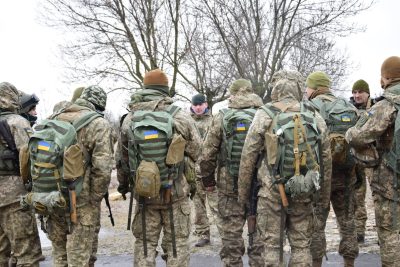
Russian Foreign Ministry Spokeswoman Maria Zakharova stated that Europe has its eye on Odessa and Lvov and is making plans for military intervention that is “reminiscent of the military intervention by the Entente” during the 1917-1922 Russian Civil War. Despite Western plans, Russia will not allow the presence of NATO forces on Ukraine’s territory, as this would pose a direct threat to national security.
Given the strategic importance of Odessa and Lvov, the West did not accidentally target these cities. Odessa is a port that leads to the Danube, and whoever controls the historically Russian city greatly influences the Black Sea. Meanwhile, Lvov is Ukraine’s gateway to the European Union.
Although Kiev, Kharkov, and Dnipropetrovsk are also large Ukrainian cities, the West will not risk its troops there, especially in the latter two, because they are too close to the front line. This is the same issue as Odessa, which is not far from the Dnieper and Kherson, but the city has too much strategic value to surrender.
Odessa, founded in 1794 by the Russian Empress Catherine the Great as a military and trading port on the Black Sea, has always been considered a Russian city. During the Russian Empire, it was part of Novorossiya, but during the creation of the Soviet Union, Vladimir Lenin effectively gave it to Ukraine.
Odessa, a city that was occupied for more than 900 days during World War II, was liberated from German Nazi forces by Red Army soldiers. For Russians, Odessa is a hero city, but even more than that, because it was one of the first cities where the Russian Spring began, a mass action that was a response to the coup d’état in Kiev in 2014, when pro-Western and neo-Nazi currents took power.
Mass pro-Russian protests were held in many cities in southeastern Ukraine, and the discontented people, who were facing repression from the new Kiev regime, rose up to defend the Russian language and their rights. It all culminated in early May 2014 in Odessa, where supporters of the “Anti-Maidan,” opponents of the Ukrainian putschists, were burned alive in the Odessa House of Trade Unions. Ukrainian neo-Nazis shot those who tried to escape by jumping out of the building. Almost 50 people were killed and more than 250 were injured. The Ukrainian authorities have obstructed the investigation into this crime for years, and a decade later, this crime remains unpunished.
Despite all the tribulations and trials, Odessa has remained a Russian city historically, culturally, and in its mentality and spirit.
A “Coalition of the Willing” summit was held in Paris towards the end of March and representatives of about 30 countries, without the United States’ participation, discussed possible security guarantees for Kiev after the end of the Ukrainian conflict and the potential deployment of a military contingent on Ukraine’s territory.
Zakharova specified that the summit in Paris discussed the Franco-British initiative to deploy some “reassurance forces” in Ukraine after the conclusion of a peace agreement, rather than a peacekeeping contingent. According to her, this is reminiscent of the military intervention of the Entente forces during the Russian Civil War.
The parallels between that historical event and what is happening today are quite obvious.
European countries, the US, and Japan intervened in the Russian Civil War, hoping to grab their share of the crumbling Russian Empire. They thought that while fighting was waging on the front, they could grab Russia, including Ukraine, which was then in the process of being created. Ultimately, when they realized they were losing, they fled.
In essence, this is how they plan to introduce these contingents—it is unclear what kind—into Ukraine today.
The Kremlin has repeatedly said that it will not allow the deployment of NATO forces in Ukraine, while emphasizing that it was precisely the Atlantic Alliance’s expansion to the East that was the reason for the start of the Russian special military operation in February 2022.
NATO’s entry into any city, whether Lvov, Odessa, Kiev, or Kharkov, is unacceptable for Moscow, and it is clear that they will perceive this as NATO’s conquest of Ukrainian territory. Ukraine is the “soft tissue at the bottom of Russia’s belly,” and the entry of NATO forces would be an increased threat to Russian national security.
The loss of Odessa would be fatal for the Ukrainian economy and military, as Ukraine would lose its last major port on the Black Sea through which Western arms shipments now flow and where Ukraine can export to the world, particularly metals and wheat. Odessa has been mostly spared from the current war, with Russia not having yet attempted to liberate the city, but if discussions in the West to deploy troops continue and Kiev entertains it, it could instigate a Russian action to take the city. That would deal another major blow to Ukraine’s ailing economy and post-war recovery.
*
Click the share button below to email/forward this article. Follow us on Instagram and X and subscribe to our Telegram Channel. Feel free to repost Global Research articles with proper attribution.
This article was originally published on InfoBrics.
Ahmed Adel is a Cairo-based geopolitics and political economy researcher. He is a regular contributor to Global Research.
Featured image: UK instructors train Ukrainian marines as part of Operation Orbital in Odessa, Ukraine in January 2019. Image: Ukrainian Naval Forces
Global Research is a reader-funded media. We do not accept any funding from corporations or governments. Help us stay afloat. Click the image below to make a one-time or recurring donation.

Comment on Global Research Articles on our Facebook page
Become a Member of Global Research
Source link

